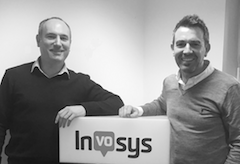 There is no going back on the rise of analytics, it's 21st Century and a widely accepted main feature of the digital revolution. On analytics the market has spoken, and we should remember that resellers will fail to meet customer expectations if they do not take heed.
There is no going back on the rise of analytics, it's 21st Century and a widely accepted main feature of the digital revolution. On analytics the market has spoken, and we should remember that resellers will fail to meet customer expectations if they do not take heed.
One of the most significant aspects of customer analytics has been the speed of its ascendency and its emergence as a defining issue for companies such as TeleWare. The central task for TeleWare is to convert customer data into actionable insights and revenues. In meeting this challenge it has been assertive, even linking up with leading academics at Teesside University and enlisting the full-time services of an Artificial Intelligence specialist. Now, TeleWare is increasingly putting actionable analytics at the heart of everything it delivers. "It's all about providing the right information, in the right place and at the right time so that our partners and customers can deliver world class customer experiences," said Lee Mansell (pictured), Product Manager.
In a mobile dominated multi-channel world, establishing a single 360 degree, real-time view of customers and their interactions has never been more important. Therefore the role of analytics is massive. Emotion is the most significant driver of loyalty, so if a customer experiences something that triggers a negative reaction it needs to be identified.
"During calls a customer's emotion can be recorded and later analysed to help understand what triggered each response, enabling counter measures to be put in place," explained Mansell. "But it's not just about being reactive. Analytics can be used to predict what a customer is going to order and potentially deal with any account issues before a client has noticed. This kind of proactive customer service creates a more favourable view of a brand and increases customer loyalty."
Although analytics is rising, it's not about taking an all-new approach to the market. The conversation with customers in terms of promoting an analytics solution is, in many respects, the same as a traditional one. The key is to focus on the customer's desired outcomes and then look creatively at how an analytics-led approach can contribute. "Look beyond the glossy front end dashboards and establish solutions that deliver the customer's must-haves in terms of flexibility, automation, security and ease of implementation," said Mansell. "Look for vendors that can provide a rich service wrap to help you and your customers extract real value from analytics tools tailored to their specific business needs."
The one dimensional nature of traditional customer engagement is being replaced by a rising demand for more personal services via channels of choice, which can be disruptive to brands and requires a smart response. Reputation is influenced by a multitude of sources. Word-of-mouth and word-of-social-web can combine rapidly to create potent forces for good or otherwise. "The contact methods are all measurable, but the challenge is around consistency. For example, research shows that the same question posed to a company via chat, email or phone call will often produce a different response," added Mansell.
"It is vital to challenge conventional wisdom and be prepared to trial extensively, innovate and learn rapidly from early experiences in using these methods. Be prepared to be surprised. The way to monetise a company's data is for the results to be simple and provide recommendations where they should focus resource. The easier it is for a company to use the results to make improvements and increase profit the more valuable this kind of analytics would be to them."
The age of analytics is in its infancy but there is evidence to show that it has already changed the course of the comms industry. Communication, like computing, is going through a paradigm shift with analytics a prime mover for change. "Every forward looking business needs to manage the customer experience through insights into client data, but for resellers wanting to shape the future of customer engagement it's a case of going back to basics," stated Phil Reynolds, joint CEO, Oak Innovation. "What is the customer's business? Where are the touch points? What CRM do they use and how will the workflow include the analytical elements? With an affordable cloud delivery model the ultimate solutions will scale from a one man band to the likes of Amazon. It's an exciting time."
As we move away from call centres into the 21st century contact centre where agents are dealing with a range of multi-channel communications, Oak's analytics and media blending offerings have become relevant to today's customer experience, noted Reynolds. "It's also important to be engaging with AI and bots which service a continuing higher percentage of enquiries and improve the customer experience," he added. "The AI revolution will see more and more intelligent automated services dealing with customer interactions."
It's just as important, says Reynolds, to interface with all forms of media, especially social media where customer complaints tend to be posted and need to be monitored. Other media includes the traditional email, Whatsapp, Webchat, SMS and regular surveys. "It's not difficult to measure different methods of communication but it is difficult to create a unified valuing system," added Reynolds. "Is an email equal to a phone call? Is a webchat equal to a tweet? You can focus on the outcomes of every interaction, you can automate the customer survey, you can get a measure of the overall satisfaction and use this as a driver throughout the business."
Bringing more and more data together opens up the opportunity for ever more complex modelling which delivers more insight, which in turn highlights the key performance indicators that are more measurable and manageable. Not surprisingly, the analytics and reporting market has become hotly contested as comms companies jostle to understand their customers' journeys quickest to maintain an all important competitive advantage. "For example, we can alert a supervisor to calls in a queue that are leads created in Salesforce.com," said Steve Tutt, Marketing Director, VanillaIP. "The supervisor can then prioritise such calls to the top of the queue. The information has to be relative and contextual to have maximum value."
Customer-side analytics and call centre solutions go hand in hand, with more of the value proposition in the reporting rather than call routing. "We have committed considerable R&D in developing custom reports that measure every conceivable call handling parameter," added Tutt. "Relying on the native BroadSoft reports is not an option. In fact, we have hidden them on our platform unless a customer specifically asks for them to be available. We layer intelligence over the BroadSoft call centre solution. An example is our call centre Supervisor which can export a list of CLIs that were abandoned into the queues and assign them to agents for call back."
Analytics as part of the overall customer solution is key, but let's not overlook analytics for the reseller. "In the old PBX days there was a limited opportunity to up-sell customers," stated Tutt. "With cloud, the up-sell and cross-sell opportunity is massive, but you need insights into the user community to be able to execute. Our Uboss reseller reports show P&L, services deployed, how many users/services/handsets were deployed and when. For example, resellers can see how many of their customers are not using a specific service, run an export of all their contact details for an ecast campaign or attach a promo pdf that gets sent with the bill. This is the beauty of cloud and the opportunity for the channel to move beyond fire and forget models."
Customers have many unique identifiers now - CLI, email address, twitter handles and cookies on their machine that are best managed by the customer's CRM platform. "Our integration allows us to dip into the CRM, such as Salesforce.com or MS Dynamics, to profile any calls in a queue as leads or contacts," noted Tutt. "Such mashups of multi-vendor solutions add value to the customer because the UC platform is never going to replicate the CRM, but work with it."
Tracking and monitoring conversations are fundamental to understanding the full customer experience and incorporating call analytics to any Customer Journey Map provides business leaders with the assurance that their decisions are based on a more complete picture of their customers' behaviour. Tollring achieves this by delivering a single mobile-optimised portal as a cloud, hybrid or on-premise solution, with different views for different user types (supervisors, agents, managers, administrators etc). "A user interface is important to customers, along with being intuitive and easy to use," said Tony Martino, Managing Director, Tollring.
He sees most demand for analytics in business reporting for customer facing teams. "Typically, companies keep track of call centre analytics, but in our experience many organisations forget about what happens outside of the call centre," added Martino. "This could be communications within business departments (sales teams, finance teams, support teams etc) or communications that fall outside of call centre statistics, such as those that do not reach the call centre because the queue is full, those that are transferred out of the call centre or calls transferred into the call centre. The complete picture is essential to understanding the entire customer experience."
Statistics show that when calls are left unanswered, 56.7 per cent of callers do not leave a message and don't call back. When it comes to call analytics, the value of a missed call soon becomes apparent. "Understanding abandoned calls, waiting and unreturned missed calls are critical to monetising the value of a lost call," said Martino. "A big challenge is ensuring that the whole sales team understands the importance of selling the value, the marketing team understands the importance of promoting the value and the account management teams understand the importance of highlighting the value."•

 The industry needs more women like ICA founder and Director Pamela Blanchard. Not just to help redress the gender imbalance, but to take the sector to a whole new level.
The industry needs more women like ICA founder and Director Pamela Blanchard. Not just to help redress the gender imbalance, but to take the sector to a whole new level. Here, Dave Trivett, Managing Director of Assembly Channel Services (ACS), reveals how a wake-up call ultimately opened the channel's eyes to the true nature of partner engagement.
Here, Dave Trivett, Managing Director of Assembly Channel Services (ACS), reveals how a wake-up call ultimately opened the channel's eyes to the true nature of partner engagement. If anyone still needs convincing that the old world order in comms is finished, they need look no further than the scale and scope of portal developments.
If anyone still needs convincing that the old world order in comms is finished, they need look no further than the scale and scope of portal developments. The Internet Telephony Services Providers' Association (ITSPA) has embarked on a two pronged project this year - to help unravel the tangled issues around number portability and to push the Government into more effectively combating toll fraud. Here, Chair of ITSPA Eli Katz outlines the big lobbying plan.
The Internet Telephony Services Providers' Association (ITSPA) has embarked on a two pronged project this year - to help unravel the tangled issues around number portability and to push the Government into more effectively combating toll fraud. Here, Chair of ITSPA Eli Katz outlines the big lobbying plan. In philosophy 'Occam's razor' decrees that the simplest explanation is usually the right one and it's a principle that Paul White has applied to his business life when things get too complicated. The approach has worked remarkably well for him and his NTA hosted services business is now giving resellers a fast and easy route to riches.
In philosophy 'Occam's razor' decrees that the simplest explanation is usually the right one and it's a principle that Paul White has applied to his business life when things get too complicated. The approach has worked remarkably well for him and his NTA hosted services business is now giving resellers a fast and easy route to riches. Ericsson-LG champion Intellia has marched into Edinburgh waving the Korean vendor's flag. Its mission is to firmly establish the brand in Scotland's capital having secured a new operational base in the city, according to Directors Tony Whelan and David Fisher.
Ericsson-LG champion Intellia has marched into Edinburgh waving the Korean vendor's flag. Its mission is to firmly establish the brand in Scotland's capital having secured a new operational base in the city, according to Directors Tony Whelan and David Fisher. There is no going back on the rise of analytics, it's 21st Century and a widely accepted main feature of the digital revolution. On analytics the market has spoken, and we should remember that resellers will fail to meet customer expectations if they do not take heed.
There is no going back on the rise of analytics, it's 21st Century and a widely accepted main feature of the digital revolution. On analytics the market has spoken, and we should remember that resellers will fail to meet customer expectations if they do not take heed. The next phase of Invosys' growth strategy has begun with characteristic earnest and its business leaders have big markets to aim at and a model that must be admired.
The next phase of Invosys' growth strategy has begun with characteristic earnest and its business leaders have big markets to aim at and a model that must be admired.